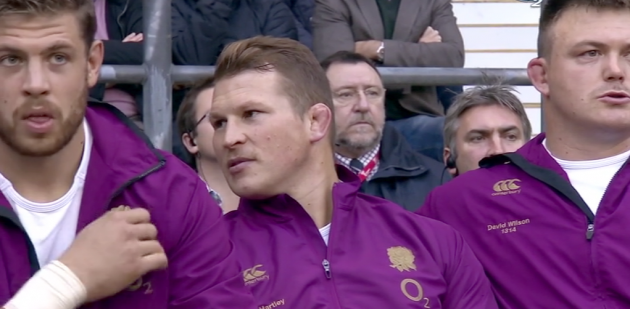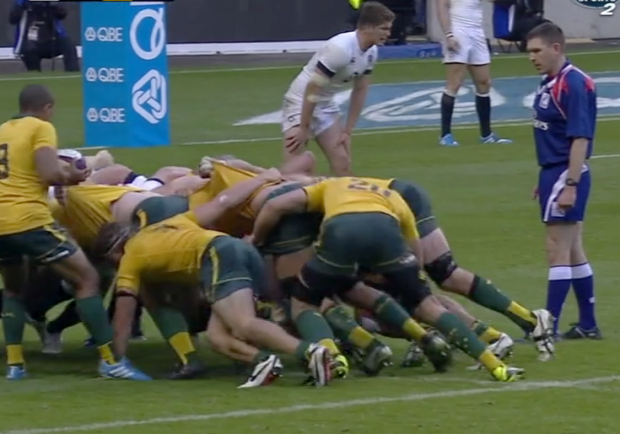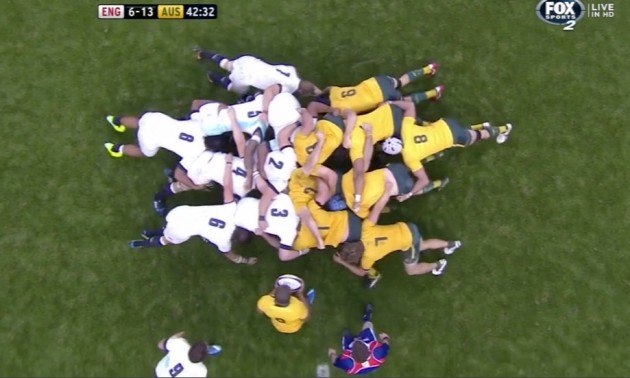No matter how much it’s been happening of late, losing to the Poms at anything still sucks. On reflection it wasn’t just this factor that ruined my Sunday, it was the realisation of something far more troubling in this Wallabies performance.
Playing not to lose, loses
This must surely be why the sting of disappointment was so deep. No-one liked losing to the All Blacks a couple of weeks ago, but the Wallabies could walk away saying ‘we had a crack’, and looked good doing so. It built the confidence of both those playing and those watching.

So to go to Twickenham, plan to play zero rugby and still lose was a bitter pill to swallow. How do we know they planned it? Just look at the stats.
Against one of the best sides the world has seen at home in Dunedin two weeks ago, the Wallabies were able to offload 16 times and make seven line breaks. Against England, they made just one offload and three line breaks. Remember Izzy not offloading to Cummins? Remember Will not dropping the inside ball to Adam Ashley-Cooper around the edge of that ruck? They weren’t accidents.
Against New Zealand the Wallabies kicked 15 times and ran 713 metres. Against England Australia kicked 28 times and ran just 383 metres. I can remember two first-phase moves, if you count a long cut-out to Izzy as a move. We actually ran fewer metres in the second half than the first, so the brief at half time was obviously to defend a seven point lead.
Some will say this was arrogance – that we thought the Poms only needed half as much footy to knock ’em over. I don’t read that; I read that fear drove our strategy. Fear that another slew of our mistakes would lead to scrums we’d get dished on which would lead to points Farrell would slot. If you twist the logic hard enough you can even say this strategy worked in that we only conceded 10 turnovers (versus 24 in Dunedin) – after all if you don’t have the ball it’s harder to drop it!
Where this strategy came unstuck – yet again – was our assumption that if we played little or no rugby, neither would our opponents. The net result? Two tries to England and that statistical mean one try to the Wallabies. No, not even England stooped to that inability to cross the whitewash.
In my opinion this was Ewen McKenzie’s first big misstep in the Wallabies job, because it was clearly not just their performance that cost the Wallabies, but their strategy as well. Link could say that this strategy got the Reds into the Super Rugby finals this year – with them scoring amongst the fewest average number of tries in the whole competition (two per match). What that fails to acknowledge is that Queensland also gave up the fewest tries (one per match), which is clearly not something the Wallabies – or many teams at all – are able to achieve at international level.
The scrum – groundhog day
My concern here is not that the management of the Wallabies aren’t seeing the problems, it’s that they’ve resigned to living with them. The Reds have progressed in the competition over the last years with a scrum that has rarely been dominant and at times weak, opting instead for work rate and dynamism within the tight five and back row. The hobbling on with Ben Alexander at tight head and James Slipper at loose head indicates to me we are doing the same with the Wallabies.
Let’s start by saying that in terms of the laws of the game, what George Clancy let the England eight get away with was highway robbery. Here’s a picture from the second half, see if you can spot someone not pushing square and straight even before the ball is in.
But let’s drop it there because if there’s anything we should have learned by now, it’s that in the scrum arena we’re simply bringing a knife to a gunfight, regardless of the law.
As Nick Bishop described so well on G&GR during the Lions tour, the Poms used the tactic of walking the scrum around on one side to give the impression of dominance. In this case they walked around James Slipper’s side and then combined that with Mako Vunipola boring in and under Ben Alexander. In George Clancy’s eyes, this had the effect of looking like Dan Coles had dominated at tight head while Ben Alexander had stood up under pressure at loose head. In reality the scrum was mostly stationary on Coles’ side and if anything wheeling backwards on Vunipola’s side as there was no pressure coming straight at Alexander.
But this in no way should have been a surprise – it happened just a few months ago in the Lions tour with two of the same England front row and scrum coach! To counter it Ben Alexander was going to have to stop Vunipola getting under him – through strength or height – but he couldn’t. The flankers on the tighthead side were going to have to slide up into Vunipola, but largely didn’t. We were going to need our best loosehead on the park to negate Coles’ dominance – but again, we left him on the bench.
Failing all of that, we were going to need an eight-man shove to drive straight through an England pack that had the balls to split itself in two to use such a tactic. But again we didn’t, preferring to have our openside and eight standing off most defensive scrums. Notice how steady our own ball was? That’s right, all eight men down.
Can we blame the officials?
For being inept – yes. For losing the Wallabies the match – no.
If you play a negative gameplan that lacks attacking ambition, aims to win by seven points or less and tries to ‘get away with it’ in critical parts of the game, you open yourself up to the randomness of rugby; the bounce of the ball, inept refereeing, an off day with the boot.
When will it end?



